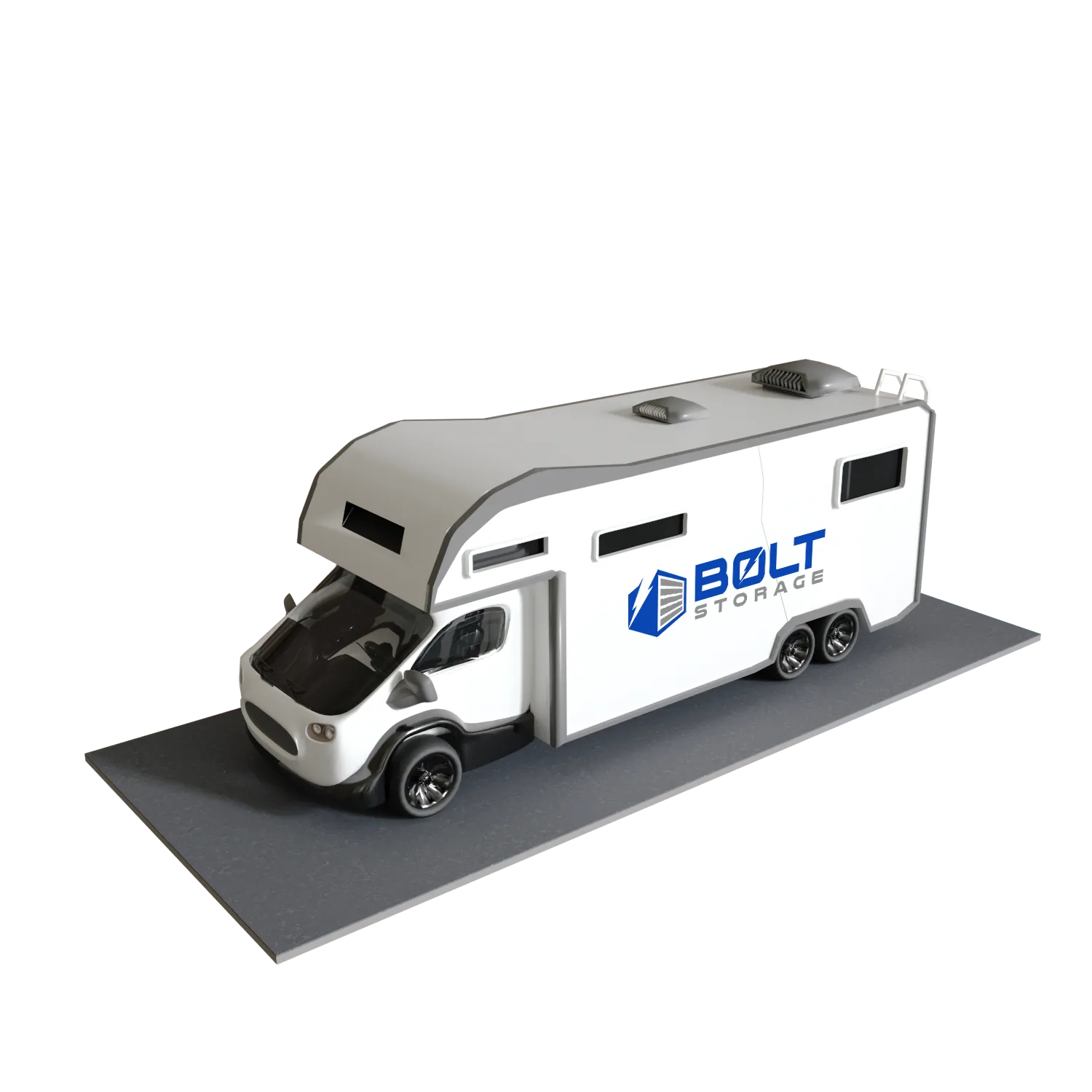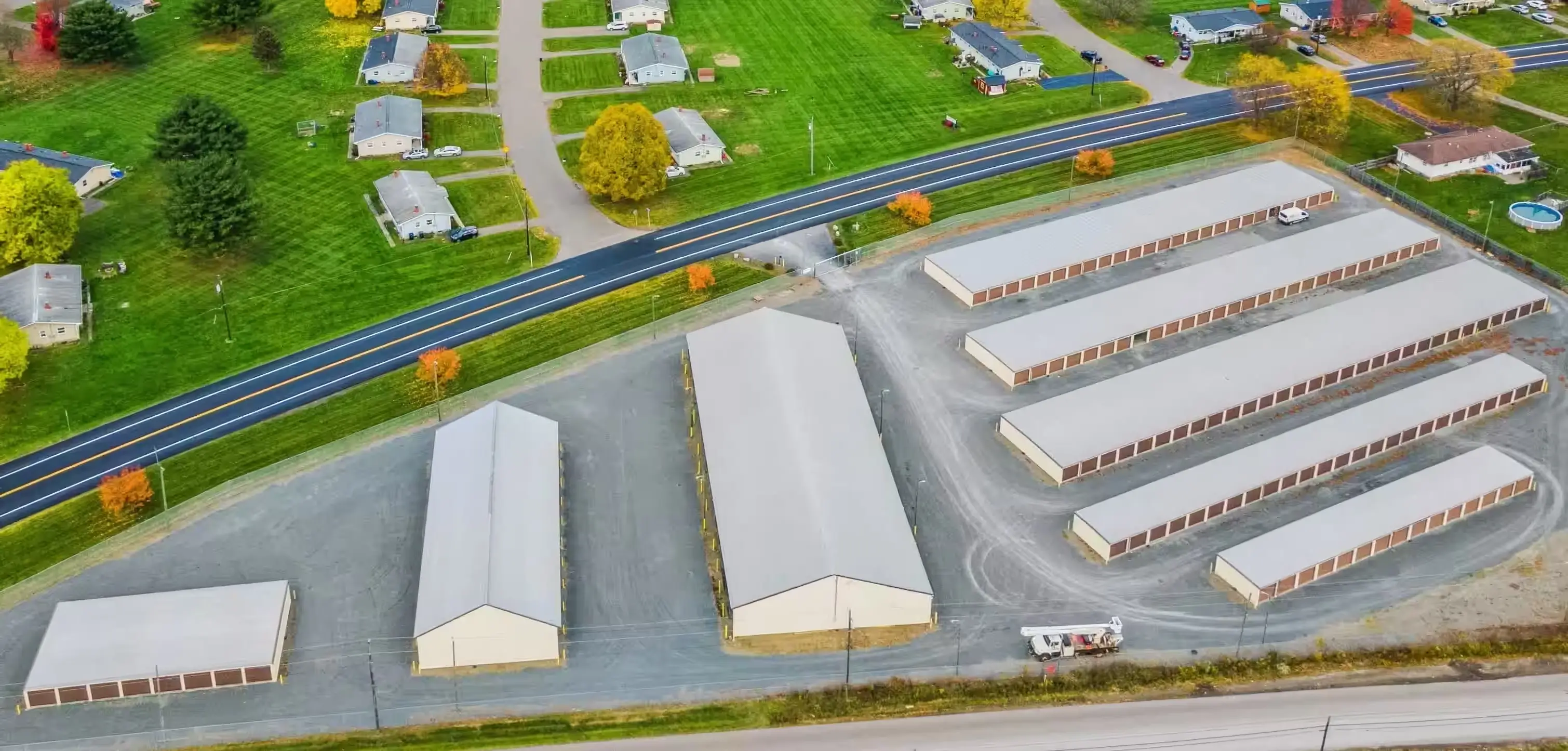For most small businesses, the choice comes down to this: self storage is significantly cheaper, faster to set up, and flexible enough to scale with your needs. Warehouse space offers more room and fewer restrictions — but comes with long-term leases, higher costs, and more overhead than most small or growing businesses can justify.
If you're storing inventory, tools, equipment, files, or seasonal supplies, self storage is almost always the right answer. If you're running a distribution or fulfillment operation with high volume and dedicated staff, a warehouse may be worth the investment.
Here's a full breakdown to help you decide.
What Is Self Storage for Business?
Self storage units are secure, enclosed spaces you rent inside a facility — available in sizes from 5x5 up to 10x30 and larger. You rent only the space you need, access it on your own schedule, and scale up or down as your business changes.
There's no broker, no lengthy lease negotiation, and no waiting. Most businesses can reserve a unit online and move in the same day.
Pros of Self Storage for Business
- Affordable: A 10x10 unit typically runs $80–$150/month — a fraction of commercial lease costs
- Month-to-month flexibility: No long-term contracts, no penalties for downsizing
- Fast setup: Rent online in minutes, move in today
- Easy to scale: Switch unit sizes as your inventory grows or shrinks
- Accessible: Many facilities offer extended or 24/7 gate access
Cons of Self Storage for Business
- Space is limited: Not practical for pallet-volume inventory or large equipment fleets
- Storage restrictions: No food, flammables, hazardous materials, or perishables
- No value-added services: Storage only — no on-site labor, shipping, or inventory management
Best For
Small businesses, contractors, freelancers, e-commerce sellers, and solopreneurs who need affordable, flexible space for inventory, tools, supplies, documents, or seasonal equipment — without the commitment of a commercial lease.
What Is Warehouse Storage?
Warehouses are large commercial buildings — typically thousands of square feet — designed for high-volume storage, distribution, or fulfillment operations. Businesses either lease private warehouse space or use shared third-party logistics (3PL) facilities that bundle storage with shipping and inventory management services.
Pros of Warehouse Storage
- Large capacity: Designed for pallets, bulk inventory, and heavy equipment
- Fewer restrictions: Can often accommodate food, chemicals, and other regulated goods
- Optional services: Many 3PL providers offer packing, fulfillment, and shipping
- On-site staffing: Some facilities include dedicated warehouse staff
Cons of Warehouse Storage
- Expensive: Commercial warehouse leases typically run $5–$15 per square foot annually, plus utilities, insurance, and sometimes staffing costs
- Long-term contracts: Most leases start at 1–3 years minimum — some require 5
- Slower to set up: Requires contracts, legal review, and often a broker
- Harder to scale: You may be locked into more space than you need during slow periods
Best For
Established businesses with high inventory turnover, distribution or fulfillment operations, or specialized storage needs that self storage restrictions prevent — such as food products or flammable materials.
Self Storage vs. Warehouse: Side-by-Side Comparison
How Much Does Each Option Cost?
Cost is usually the deciding factor for small businesses.
Self storage is straightforward: you pay a monthly unit rate with no hidden overhead. A 10x10 unit runs roughly $80–$150/month depending on location. A 10x20 runs $110–$300/month. Climate controlled storage units cost slightly more. No utilities, no insurance beyond your storage protection plan, no staffing.
Warehouse space is significantly more complex. Commercial lease rates vary widely by market, but in most U.S. cities you're looking at $5–$15 per square foot per year for raw space — before utilities, insurance, equipment, and any staffing costs. A modest 1,000 sq ft warehouse space could run $500–$1,500/month in rent alone, with total costs often doubling once overhead is factored in.
For most small businesses, the math strongly favors self storage unless volume genuinely requires warehouse scale.
Which One Is Right for Your Business?
The honest answer for most small businesses: start with self storage. It costs less, requires no commitment, and can be adjusted as your needs change. You can always transition to warehouse space later if your operation outgrows it.
Choose self storage if you need secure, affordable space for inventory, tools, documents, or equipment — and you want flexibility without a long-term lease.
Choose warehouse storage if you're managing high-volume inventory, running a fulfillment operation, need on-site staff, or storing items that self storage facilities prohibit.
If you're genuinely on the fence, the monthly cost difference alone usually resolves the question. Start small, prove the need, then scale.
Why Small Businesses Choose Bolt Storage
- 65+ locations across 11 states — likely near your operation
- Month-to-month leases with no hidden fees
- Units from 5x5 to 10x30+ to fit any business size
- Rent online in minutes, move in the same day
- Extended access hours at most locations
- Climate-controlled units available for sensitive inventory
From solo contractors to small e-commerce brands, Bolt Storage gives businesses the space they need without the warehouse price tag.
FAQ: Business Storage
Can I run a business out of a storage unit? You can use a storage unit to store business inventory, equipment, and supplies — but you can't operate a business from inside the unit itself. No clients, no employees working on-site, and no power tools running inside the unit. It's storage space, not office or workshop space.
Is renting a storage unit tax deductible for a business? In most cases, yes. If the unit is used exclusively for business purposes, the monthly rental cost is generally deductible as a business expense. Consult your accountant to confirm how it applies to your specific situation.
What size storage unit does a small business need? It depends on what you're storing. A 10x10 works well for documents, supplies, and small inventory. A 10x15 or 10x20 suits contractors with equipment or businesses with moderate inventory. Use our sizing guide or call your nearest Bolt Storage location for a recommendation.
Can I store business inventory in a self storage unit?Yes — inventory is one of the most common business uses for self storage. The main restrictions are no food or perishables, no flammables or hazardous materials, and no items prohibited by your rental agreement. See the full list of what not to store.
How is self storage different from a 3PL warehouse?Self storage is space you manage yourself — you bring items in and out on your own schedule. A 3PL (third-party logistics) warehouse handles storage, fulfillment, and shipping on your behalf. 3PL is more hands-off but significantly more expensive and better suited to high-volume e-commerce operations.
Can I get 24/7 access to my business storage unit?Many Bolt Storage locations offer extended access hours, and some offer 24/7 gate access. Check availability at your specific location when reserving.
Ready to get your business organized? Find a Bolt Storage location near you and reserve your unit online today.
Find Storage Units Near You Up To 75% Off
Discover nearby storage units with up to 75% off at Bolt Storage. Affordable solutions for your storage needs. Find convenience without the high cost.
PRICE MATCH GUARANTEE
We will beat any price in town


.webp)

.jpeg)
.jpeg)



